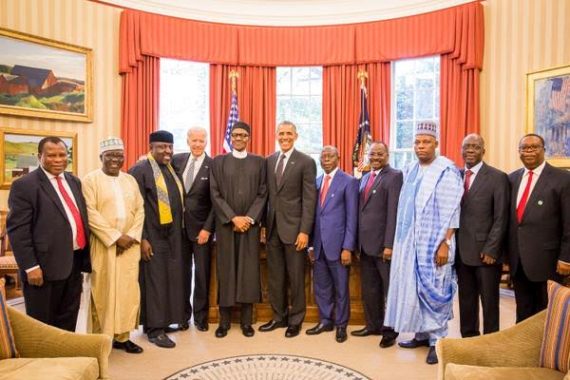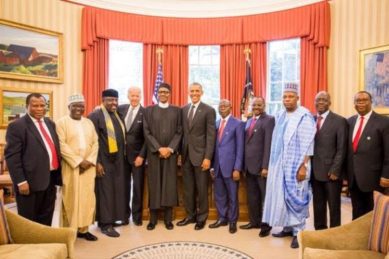National Issues
What lessons did Okorocha and others learn in America? -By Niran Adedokun

Sometimes when in my own company, I wonder what leaders of other countries think about Nigerian leaders. One of those occasions came up last week when pictures of billboards erected in celebration of the “good fortunes” of Governor Rochas Okorocha of Imo State to have met and shaken hands with the United States’ President, Barack Obama, went viral.
Without holding Okorocha in grudge for “celebrating” the rare opportunity of meeting the world’s most important leader, I asked myself how disgusted Obama and his people would feel if this exhibition of self-importance came to their knowledge.
But Okorocha was not alone in this display of vainglory. The Edo State Governor, Adams Oshiomhole, took his gorgeous brand new wife with him. And she lit up every photo opportunity that the spouse had with her bright countenance. The governor must have been proud of himself for affording the entourage the privilege of the radiance of the presence of his helpmeet.
But it calls to mind the question of what these state governors learnt from the opportunity to travel with the president. Until now, none but Oshiomhole who has information about how much a particular minister stole from Nigeria under the immediate past administration, has told us what their state stands to gain from that trip in which they were on the President’s advance party. They only came back to act like excited schoolchildren who got their first opportunity for an excursion.
In the course of the week, I pondered on what could be behind the decision of the President to travel with these governors, all of whom are incidentally from his All Progressives Party. Is it the protocol for heads of government to travel with governors? How many governors were on the entourage of Obama during his recent tour of Africa for example? Why did Buhari have such number of governors embark on this trip which is likely to have cost each of them tens of millions of naira in spite of the economic crunch that states currently face?
I then remembered the following words from Buhari’s inaugural speech: “…relations between Abuja and the States have to be clarified if we are to serve the country better. Constitutionally, there are limits to the powers of each of the three tiers of government but that should not mean the Federal Government should fold its arms and close its eyes to what is going on in the states and local governments. As far as the constitution allows me, I will try to ensure that there is responsible and accountable governance at all levels of government in the country…”
Although I always wondered how the President hoped to achieve the level of monitoring that would guarantee the success that he anticipated in this speech, I was happy that he acknowledged the importance of states in the development of the country from the outset. The invitation of these five governors therefore appeared to me like an orientation on how the administration of our states would improve.
To clarify, I hold the position that states are the weakest links to effective governance in Nigeria. Although I accept arguments that the current revenue allocation formula in which the Federal Government receive 52 per cent of revenue accruing to the country detracts from the prospect of development in the rural areas, I am still unable to come to terms with the level of stunted growth in our states.
If we take the argument that the allocation formula is responsible for the situation of our states for example, anyone familiar with the clout of our governors will agree that effecting a review in the allocation sharing formula should not be so herculean.
For starters, most commissioners on the Revenue Mobilisation Allocation and Fiscal Commission which is empowered by Paragraph 32 (b) Part I of the Third Schedule to the 1999 Constitution of the Federal Republic of Nigeria (as amended) to review the revenue allocation formula from time to time would have been nominated by the governors. In essence, any chance that governors of the 36 states subscribe to the review of this formula, would see the RMAFC initiate the process.
The governors, if they were united, would also have been able to lobby the President into tagging along with whatever new recommendation the RMAFC comes up with.
Not only that, the aggregation of such an opinion would also see the review pass through the National Assembly as most members of those chambers are there on the benevolence of their state governors or those close to them.
One of the things that stand against the likelihood of a review of this formula in my opinion is the inability of the state governors to come together as one and fight for the reversal of the formula to which they all attribute their handicap. It is ironical that trifles like who holds one position or the other, party affiliations, ethnic and religious sentiments are more important to our governors than the actualisation of better revenue for their states.
Governors belonging to different political parties are not a strange thing to democracy. In the United States from where the leader of the Progressive Governors Forum just came back, governors are mostly elected on the platform of the Republican Party and the Democratic Party. As in Nigeria, governors elected on the platform of each of these parties have individual associations with which they foster the peculiar interests of their parties but they also come together as one under the umbrella of the National Governors’ Association.
The NGA whose annual conference I was privileged to attend a few years back prides itself as a bipartisan organisation through which governors of the US “share best practices, speak with collective voice on national policy and develop innovative solutions that improve state government and support the principle of federalism.”
Is there any chance that the governors who recently visited the US learnt anything about working together for the interest of Nigeria? In the past couple of years, the only time you found our governors speak with one voice was when there was some money to be shared from the Excess Crude Account even though we are unable to associate these funds to any durable venture.
I also hope that the returnee governors got the lessons that most states in America do not go cap in hand to the Federal Government at the end of the month. This is mostly due to the creativity of governors which has seen tourism, entertainment and agriculture amongst other become money spinners for states. Would governors of Nigeria, a country which boasts of 74 million hectares of fertile land out of which only 34 million hectares are cultivated reconsider? Would our governors look at the enormous potential that exists in entertainment? Would one or more state governments capitalise on the exploits that Nigerians are making in the music, movie and fashion industries as an avenue to bring prosperity unto their states like Hollywood has done California.
Sixteen years into the return of civil rule in Nigeria, no state in the country can boast of a world class medical facility which can reduce the N250bn expended on health tourism annually. No state in Nigeria can boast of having moved near delivering on any of the Millennium Development Goals of reducing abject poverty, reducing illiteracy, reducing maternal and infant health yet we are happy to gallivant all over the world and engage in narcissist indulgences like the one Okorocha’s supporters gall us with.
My word for Buhari is that to maximise the potential of his administration to effect change, he must actualise the words that he spoke at his inauguration and encourage all governors to look inwards, seek ways to make their states prosperous, free local government councils from all encumbrances and shun all the shenanigans that become the trademark of governance in Nigeria.
Written by Niran Adedokun (@niranadedokun)




















